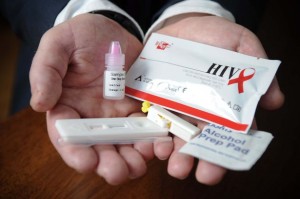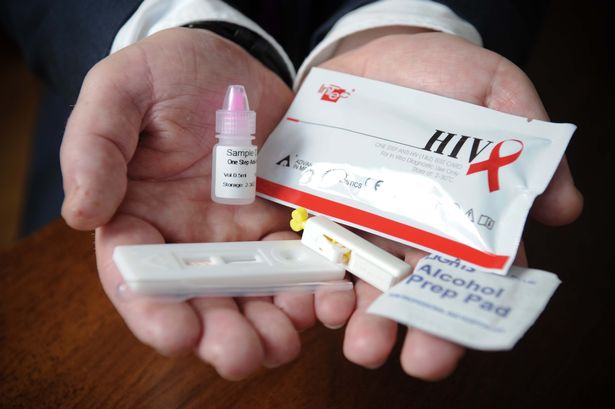HIV infections continue to rise
 Public Health England reports greatest number of new diagnoses in gay men
Public Health England reports greatest number of new diagnoses in gay men
The Report published today from Public Health England (PHE) – ‘HIV in the United Kingdom 2014 Report’ – states that in 2013 there was the highest ever number of gay men diagnosed with HIV – 3,250. 1 This is the equivalent of nine gay men receiving a positive HIV diagnosis every day.
PHE publishes the latest statistics for HIV in the UK. The figures highlight the need to increase both the number and frequency of HIV tests.
HIV virus
A new report published by Public Health England (PHE) today (18 November 2014), in advance of National HIV Testing Week, shows that there are now nearly 110,000 people living with HIV (Human immunodeficiency virus) in the UK. Around a quarter of these (26,100) are unaware of their infection and at risk of passing on the virus to others through unprotected sex. Encouragingly, the proportion of people diagnosed with a late stage of HIV infection fell from 57% in 2004 to 42% in 2013.
The report shows around 6% of gay and bisexual men are now living with HIV, rising to 13% in London – with 3,250 newly diagnosed in 2013, an all-time annual high. It is estimated that over 7,000 gay men have an HIV infection that remains undiagnosed and that an estimated 2,800 men acquired HIV in 2013. These figures underline the need to further increase both the numbers and frequency of HIV tests, which is critical to tackling the ongoing high levels of HIV transmission.
Whilst the large majority of black Africans do not have the HIV infection, the report also draws attention to the fact that one-third of the 40,000 black African heterosexual men and women living with HIV in the UK do not know they have HIV.
Dr Valerie Delpech, head of PHE ‘s national HIV surveillance, said: “We can’t overstate the importance of testing for HIV to ensure an early diagnosis.
“People diagnosed promptly with HIV infection can expect to live long and healthy lives. However, in 2013 people diagnosed with HIV late were 10 times more likely to die in the first year of diagnosis compared to those diagnosed promptly. People who remain unaware of their infection are also at risk of transmitting HIV to others.
“Knowing one’s HIV status is the key to both effective treatment, and to preventing onward transmission. This is why we are promoting the National HIV Testing Week. The campaign encourages people who are most affected by HIV to take an HIV test. This includes gay, bisexual and other men who have sex with men (MSM) and black Africans in particular.”
Professor Noel Gill, Head of PHE’s HIV & STI department, said: “Used correctly and consistently, condoms remain an inexpensive and effective way to prevent HIV. We are also now seeing important and exciting data on ways to use antiretroviral medication to prevent HIV. PHE has accelerated its support of the evaluation of these measures as they may help to turn the tide on the HIV epidemic.”
HIV testing and safer sexual behaviour to reduce risk
Early diagnosis of HIV enables better treatment outcomes and reduces the risk of onward transmission. Have an HIV test if you think you may have been at risk. Get tested regularly for HIV if you are one of those most-at-risk:
•men who have sex with men are advised to have an HIV and STI screen at least annually, and every 3 months if having unprotected sex with new or casual partners
•black African men and women are advised to have an HIV test and a regular HIV and STI (Sexually transmitted infections) screen if having unprotected sex with new or casual partners
Always use a condom correctly and consistently, and until all partners have had a sexual health screen.
Reduce the number of sexual partners and avoid overlapping sexual relationships.
Unprotected sex with p artners believed to be of the same HIV status (serosorting) is unsafe. For the HIV positive, there is a high risk of acquiring other STIs and hepatitis. For the HIV negative, there is a high risk of HIV transmission (over 7,000 of HIV positive MSM with HIV infection are unaware of their infection) as well as of acquiring STIs and hepatitis.
artners believed to be of the same HIV status (serosorting) is unsafe. For the HIV positive, there is a high risk of acquiring other STIs and hepatitis. For the HIV negative, there is a high risk of HIV transmission (over 7,000 of HIV positive MSM with HIV infection are unaware of their infection) as well as of acquiring STIs and hepatitis.
How to get an HIV test
Go to an open access STI clinic (some clinics in large cities are offering ‘fast-track’ HIV testing) or go to a community testing site.
Ask your GP for an HIV test – nowadays there is no need for lengthy discussion about the test, it just involves having blood taken, or even a finger prick.
Ask online for a self-sampling kit : HIV Self Testing

